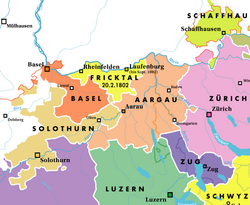Basel (canton)
| Canton of Basel Kanton Basel |
|||||
| Canton of the Old Swiss Confederacy, of the Helvetic Republic and of Restoration Switzerland | |||||
|
|||||
|
Coat of arms |
|||||
| The canton of Basel, shown within the northern part of the Helvetic Republic, as at 1802; the canton of Fricktal (adjacent) joined the Aargau later that year. | |||||
| Capital | Basel | ||||
| History | |||||
| • | established | 1501 | |||
| • | Peace of Westphalia | 15 May 1648 | |||
| • | Rauracian Republic | 1792–93 | |||
| • | Helvetic Republic | 1798–1802 | |||
| • | Partition into half-cantons | 16 August 1833 | |||
Coat of arms
Basel was a canton of Switzerland that was in existence between 1501 and 1833, when it was split into the two half-cantons of Basel-City and Basel-Country.
Before the Protestant Reformation, Basel was ruled by prince-bishops (see Bishop of Basel, whose memory is preserved in the crosier shown on the Basel coat of arms, as above). In the later 15th century, in the wake of the Council of Basel (1431–49), the city of Basel grew in wealth and importance. The University of Basel was established in 1459, and the city became an intellectual center of the German Renaissance in the years leading up to the Reformation. Erasmus of Rotterdam taught in Basel, and early printshops were set up by Johannes Petri and Johann Froben. In 1495, Basel was incorporated in the Upper Rhenish Imperial Circle, the bishop sitting on the Bench of the Ecclesiastical Princes.
...
Wikipedia


